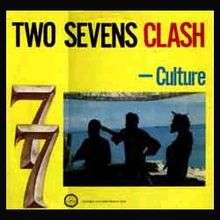Two Sevens Clash
| Two Sevens Clash | ||||
|---|---|---|---|---|
 | ||||
| Studio album by Culture | ||||
| Released | 1977 | |||
| Recorded | Joe Gibbs Recording Studio, Kingston, 1976 | |||
| Genre | Reggae | |||
| Length | 33:14 | |||
| Label | Joe Gibbs | |||
| Producer | Joe Gibbs | |||
| Culture chronology | ||||
| ||||
| Professional ratings | |
|---|---|
| Review scores | |
| Source | Rating |
| Allmusic | |
| Pitchfork Media | (9.0/10)[2] |
| Robert Christgau | A+[3] |
| Rolling Stone | |
Two Sevens Clash is the debut album by roots reggae band Culture, recorded with producer Joe Gibbs at his own Joe Gibbs Recording Studio in Kingston in 1976, and released on Gibbs' eponymous label in 1977 (see 1977 in music). The album's title is a reference to the date of July 7, 1977.
Singer Joseph Hill said "Two Sevens Clash," Culture's most influential record, was based on a prediction by Marcus Garvey, who said there would be chaos on July 7, 1977, when the "sevens" met. With its apocalyptic message, the song created a stir in his Caribbean homeland and many Jamaican businesses and schools shuttered their doors for the day.[5][6]
The liner notes of the album read: "One day Joseph Hill had a vision, while riding a bus, of 1977 as a year of judgment -- when two sevens clash -- when past injustices would be avenged. Lyrics and melodies came into his head as he rode and thus was born the song "Two Sevens Clash" which became a massive hit in reggae circles both in Jamaica and abroad. The prophecies noted by the lyrics so profoundly captured the imagination of the people that on July 7, 1977 - the day when sevens fully clashed (seventh day, seventh month, seventy-seventh year) a hush descended on Kingston; many people did not go outdoors, shops closed, an air of foreboding and expectation filled the city."
The album was reissued in 1988 with different cover art.
Track listing
- "Calling Rasta Far I" – 2:30
- "I'm Alone in the Wilderness" – 3:25
- "Pirate Days" – 2:52
- "Two Sevens Clash" – 3:30
- "I'm Not Ashamed" – 3:59
- "Get Ready to Ride the Lion to Zion" – 3:27
- "Black Starliner Must Come" – 2:42
- "Jah Pretty Face" – 3:39
- "See Them a Come" – 3:24
- "Natty Dread Taking Over" – 3:46
Personnel
- Joseph Hill – lead vocals
- Albert Walker – harmony vocals
- Kenneth Dayes – harmony vocals
- Lloyd Parks – bass
- Sly Dunbar – drums
- Lennox Gordon – guitar
- Robbie Shakespeare – guitar
- Eric "Bingy Bunny" Lamont – guitar
- Franklyn Waul – keyboards
- Errol "Tarzan" Nelson – keyboards
- Harold Butler – keyboards
- Uziah "Sticky" Thompson – percussion
- Herman Marquis – alto saxophone
- Vin Gordon – trombone
- Tommy McCook – tenor saxophone
- Bobby Ellis – trumpet
References
- ↑ Allmusic review
- ↑ Pitchfork Media review
- ↑ Robert Christgau review
- ↑ Rolling Stone review
- ↑ "Birth of a Phenomenon: 'Two Sevens Clash'". National Public Radio. July 12, 2007. Retrieved 2007-06-21.
The title refers to apocalyptic prophecies by Marcus Garvey
- ↑ "Culture Leader Joseph Hill Dies In Berlin". Billboard. August 21, 2006. Retrieved 2007-06-21.
Hill said "Two Sevens Clash," Culture's most influential record, was based on a prediction by Pan-Africanist Marcus Garvey, who said there would be chaos on July 7, 1977, when the "sevens" met. With its apocalyptic message, the song created a stir in his Caribbean homeland and many Jamaican businesses and schools shut their doors for the day.